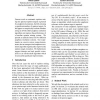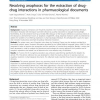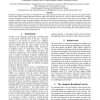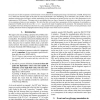119
click to vote
EMNLP
2009
14 years 12 months ago
2009
This paper proposes a probabilistic model for associative anaphora resolution in Japanese. Associative anaphora is a type of bridging anaphora, in which the anaphor and its antece...
EMNLP
2010
15 years 2 days ago
2010
This paper proposes a unified framework for zero anaphora resolution, which can be divided into three sub-tasks: zero anaphor detection, anaphoricity determination and antecedent ...
119
click to vote
ACL
2010
15 years 3 days ago
2010
Current work on automatic opinion mining has ignored opinion targets expressed by anaphorical pronouns, thereby missing a significant number of opinion targets. In this paper we e...
CORR
2002
Springer
15 years 1 months ago
2002
Springer
Anaphora resolution is envisaged in this paper as part of the reference resolution process. A general open architecture is proposed, which can be particularized and configured in ...
123
click to vote
BMCBI
2010
15 years 2 months ago
2010
Background: Drug-drug interactions are frequently reported in the increasing amount of biomedical literature. Information Extraction (IE) techniques have been devised as a useful ...
127
click to vote
CNL
2009
15 years 3 months ago
2009
Abstract. Anaphora resolution in current computer-processable controlled natural languages relies mainly on syntactic information, accessibility constraints and the distance of the...
133
click to vote
ACL
1998
15 years 3 months ago
1998
Most traditional approaches to anaphora resolution rely heavily on linguistic and domain knowledge. One of the disadvantages of developing a knowledgebased system, however, is tha...
119
click to vote
ACL
2001
15 years 3 months ago
2001
In this paper we argue that comparative evaluation in anaphora resolution has to be performed using the same pre-processing tools and on the same set of data. The paper proposes a...
111
click to vote
LREC
2008
15 years 3 months ago
2008
Evaluation campaigns have become an established way to evaluate automatic systems which tackle the same task. This paper presents the first edition of the Anaphora Resolution Exer...
102
click to vote
LREC
2010
15 years 3 months ago
2010
In recent years we have resgitered a renewed interest in event detection and temporal processing of text/discourse. TimeML (Pustejovsky et al., 2003a) has shed new lights on the n...




